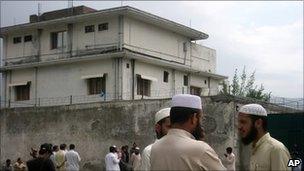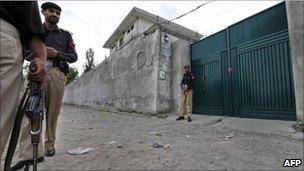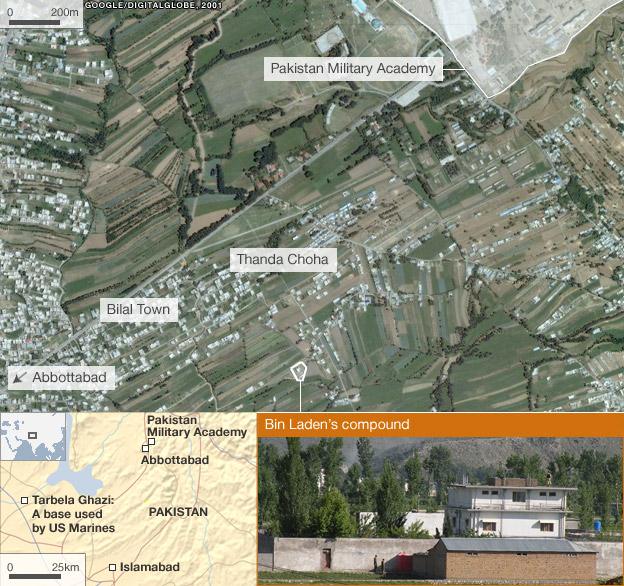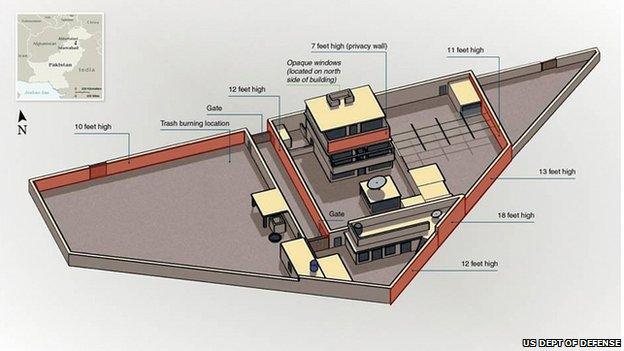Bin Laden killing: What did Pakistan know?
- Published

Bin Laden lived in this house for months, possibly years, US officials say...
Did Pakistani intelligence really know nothing about Osama Bin Laden's whereabouts until the US raid that killed him in Abbottabad on Sunday night? How did US helicopters fly so deep into Pakistani airspace without apparently being detected? The BBC's Syed Shoaib Hasan in Islamabad talks to intelligence officials to find out more.
"The first we knew they were coming was after they had crossed the Durand line," Ayaz says, referring to the border between Pakistan and Afghanistan.
Ayaz - not his real name - works for Pakistani intelligence. He spoke to me a few days after the killing of Osama Bin Laden by US Navy Seals in north-west Pakistan.
"There were four helicopters coming in very low and the protocols set in. Jets were being scrambled, but they were called back in as the US then informed the High Command.
"They gave us a grid and told us that they were going there after "a high-value" target. There are certain protocols when that happens - we take care of the outer security, while they go in and do their work.
"We certainly didn't know who exactly was in there."
Ayaz dismisses claims that the Americans jammed Pakistan's radars.
"These type of helicopters - if they fly really low - have no real signature. But they can be sighted visually - which they were - and this led to the alert."

...the authorities were apparently unaware he was right under their noses
Ayaz said that Pakistani officials believed that the Americans were going to raid a hideout in the mountains near Abbottabad.
"We didn't think it was going to be right in the city."
That is something that everybody has focused on - how Osama Bin Laden could have been right under the noses of the intelligence agencies, as the authorities claim, without their knowledge.
Pakistani security officials say it was an intelligence failure - but many people find that hard to believe.
The intelligence officials I spoke to thought the compound a poor place to hide someone.
"If he was living there, it wasn't for very long," says Mahmud, another security operative.
"Anybody who has tracked Osama knows that he would never stay in one place for more than a few weeks.
"That was the cornerstone of his security - eventually people talk and information about him would get out."
Ayaz agrees - and then points out that an even bigger issue was the choice of hiding place.
"Just look at the house - it sticks out like a sore thumb from a mile off. You've been to Abbottabad - you know how these small towns are.
"Everybody knows everything about everybody, and secretive people are routinely investigated, especially by the police.
"If anybody wants to know about the house, they should just ask the local thana [police station]."
In addition, if Osama was with the Inter-Services Intelligence (ISI), this was the last place anybody would put him in, Ayaz argues.
"If you wanted to keep him in an urban area - we have much better protected and discreet safe houses than these.
"Theoretically speaking, if the ISI had Osama and he was being kept here, the officer responsible should be court-martialled."
'Conspicuous place'
Both men, and other intelligence and security officials, also point out there are many discrepancies in the American version of how Bin Laden was located.
"They say he was living here for such a long time - then he must have been to local hospitals," says Ayaz.
"He was not a very well man - he had kidney problems and other medical issues.
"You figure it out yourself - if he was living here for so long some news would have been filtered out."
Then there is the break in pattern. All intelligence officials say Osama Bin Laden would never wander so far from the Afghan border.
This is corroborated by senior members of a leading Taliban faction, the Haqqani network - one of whom says he met Bin Laden near the town of Chitral two months ago.
Confirming the al-Qaeda leader was dead, he said he was puzzled that he had gone as far as Abbottabad.
There is also a general consensus that Osama Bin Laden preferred living in rural Pashtun and Afghan communities - although reports of him living in cities have surfaced from time to time.
While the last official sighting of him was in the Tora Bora mountains in eastern Afghanistan in 2001, this correspondent has spoken to people who say they saw Bin Laden in Waziristan in Pakistan's tribal areas in 2004-2005.
There had been no confirmed sighting since then, until the Haqqani network member spoke after he was killed.
"For someone who was so careful about his whereabouts, why would he decide to come to such a conspicuous place?" Mahmud asks.
"There could only be one outcome of such a situation - that he would be cornered and shot."
Ayaz says he has "a strong feeling... the Americans had someone inside or in contact with the people in the compound guiding them".
"Fine, they were very good operationally - but who told them he was there and would stay?
"So if Osama was indeed killed in Abbottabad, the main share of the credit goes to this person. Without him, nothing would have been possible."
It is impossible to confirm his hunch but it is an intriguing thought.

